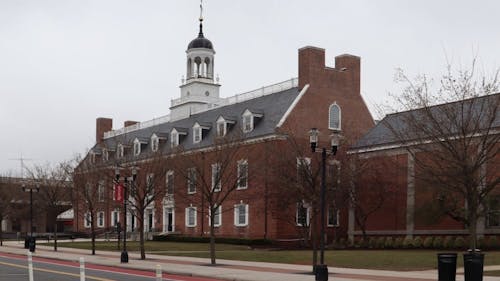Rutgers administrators, faculty members respond to ongoing police brutality, racism protests

Rutgers administrators and faculty members issued statements this week after the death of George Floyd, an unarmed Black man, at the hands of Minneapolis police officers sparked protests against police brutality and racism nationwide.
Rutgers-New Brunswick Chancellor Christopher J. Molloy and Rutgers Biomedical and Health Sciences Chancellor Brian L. Strom issued a joint statement on May 29 and said Floyd's death is an example of ongoing systemic racism.
"While we may be separated from Minnesota geographically, this incident of violence touches us all and underscores the fundamental importance of the Rutgers' vision for a world where we are all treated fairly and justly," they said, according to the statement. "We must not let ourselves become immune to the injustice we witnessed this week or come to the point when we let these acts of violence go unacknowledged."
University President Robert L. Barchi sent a statement to alumni on June 1 and said Rutgers is committed to helping dismantle racism and creating opportunities for everyone.
"Mr. Floyd's brutal death was deeply disturbing - even more so because it exposed the continued deep divide between the way most white Americans live and the way that all too many people of color are treated every day," Barchi wrote.
Vice Chancellor for Student Affairs Salvador B. Mena sent a University-wide email on June 2 and said students have a responsibility to support members of the Rutgers community and respond to injustices when they occur.
"As a University community, we must collectively recognize the heavy emotional and psychological toll this takes on all of us, especially on our Black students, staff and faculty. We must condemn these acts of violence, anti-Blackness history as a nation, systemic racism and all forms of interpersonal and structural oppression," he said, according to the email.
Vice Chancellor of Diversity, Inclusion and Community Engagement Enobong (Anna) Branch sent a University-wide email on June 4 and said the University still has work to do in order to become more inclusive.
"The anger evidenced in the national protest against racism leads many of you to reflect on instances of injustice at Rutgers today, in our classrooms, residence halls, buses, departments/offices and more," she said, according to the email. "The frustration that results when those experiences are shared without consequence or unspoken out of sheer exhaustion are felt deeply and understood."
Branch said students should review the Task Force on Inclusion and Community Values' 2017 report, which outlines steps the University can take to fix social inequities on campus, and complete a survey on how the University can become more inclusive.
The Rutgers American Association of University Professors and American Federation of Teachers (AAUP-AFT) also issued a statement condemning Floyd's murder and called for justice. The union also brought attention to the ongoing health and economic issues in America which have disproportionately affected people of color.
"As a union of educators and scholars proudly serving the diverse communities of New Jersey, we are acutely aware of the toll that systematic, state-sponsored violence takes on our own membership and the students we serve," the union said, according to the statement.
Each individual school within Rutgers, as well as Douglass Residential College and the Eagleton Institute of Politics, issued similar statements through emails or social media condemning racism and police brutality. The School of Communication and Information's statement also condemned targeted attacks on journalists while reporting on nationwide protests. Mason Gross School of the Arts used its statement to invite students to a virtual vigil held on June 2.
Mason Gross also posted a screenshot of Molloy's statement on its official Instagram account. The school was then criticized after deleting a comment from an alumna, Kai Heath, who spoke on how the school handles racial discrimination. She said she was the victim of a racial attack while studying abroad and reported the incident, but felt as though Dean of Students Mandy Feiler did not adequately respond to the incident.
After backlash from students for deleting Heath's comment, the Mason Gross account disabled comments on the original post. Interim Dean Gerry Beegan made a new post calling on alumni or students to directly contact him with complaints instead of posting them on social media. This post prompted approximately 100 comments condemning Mason Gross for its actions regarding Heath.
Beegan then made another post apologizing to the community for removing Heath's comments and other comments in support of her.
"Naively, I did not realize the pain I would cause to our community, particularly our community members of color who felt silenced by my ill-informed action," Beegan said, according to the post.
Editor's Note: This article has been edited for clarity regarding the backlash of Mason Gross's response.



